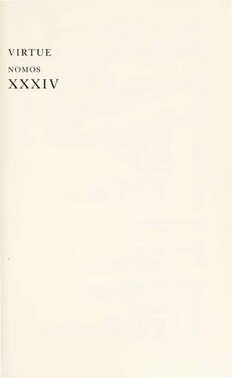
Virtue PDF
Preview Virtue
VIRTUE NOMOS XXXIV NOMOS Harvard University Press I Authority 1958, reissued in 1982 by Greenwood Press The Liberal Arts Press II Community 1959 III Responsibility 1960 Atherton Press IV Liberty 1962 V The Public Interest 1962 VI Justice 1963, reissued in 1974 VII Rational Decision 1964 VIII Revolution 1966 IX Equality 1967 X Representation 1968 XI Voluntary Associations 1969 XII Political and Legal Obligation 1970 XIII Privacy 1971 Airline-Atherton Press XIV Coercion 1972 Lieber-Atherton Press XV The Limits of Law 197 4 XVI Participation in Politics 1975 New York University Press XVII Human Nature in Politics 1977 XVIII Due Process 1977 XIX Anarchism 1978 xx Constitutionalism 1979 XXI Compromise in Ethics, Law, and Politics 1979 XXII Property 1980 XXIII Human Rights 1981 XXIV Ethics, Economics, and the Law 1982 XXV Liberal Democracy 1983 XXVI Marxism 1983 XXVII Criminal Justice 1985 XXVIII justification 1985 XXIX Authority Revisited 1987 XXX Religion, Morality, and the Law 1988 XXXI Markets and Justice 1989 XXXI I Majorities and Minorities 1990 XXXIII Compensatory justice 1991 XXXIV Virtue 1992 XXXV Democratic Community (in preparation) XXXVI The Rule of Law (in preparation) NOMOS XXXIV Yearbook of The American Society for Political and Legal Philosophy VIRTUE Edited by John W. Chapman, University of Pittsburgh and William A. Galston, University of Maryland New York and London: New York University Press • 1992 NEW YORK UNIVERSITY PRESS New York and London Virtue: NOMOS XXXIV edited by John W. Chapman and William A. Galston Copyright© 1992 by New York University Manufactured in the United States of America Library of Congress Cataloging-in-Publication Data Virtue/ edited by John W. Chapman and William A. Galston. p. cm. - (Nomos ; 34) Includes bibliographical references (p. ) and index. ISBN 0-8147-1484-6 1. Virtue. 2. Virtues. I. Chapman, John William, 1923- II. Galston, William A., 194 7- Ill. Series. BJ1521.V56 1992 170-dc20 92-17749 CIP New York University Press books are printed on acid-free paper, and their binding materials are chosen for strength and durability. 10 9 8 7 6 5 4 3 2 1 C CONTENTS Preface lX JOHN W. CHAPMAN . Contributors Xl Introduction 1 WILLIAM A. GALSTON PART I: ANALYTICAL AND HISTORICAL PERSPECTIVES 23 1. Virtue: Its Nature, Exigency, and Acquisition 25 JEAN BAECHLER 2. Religion and Civic Virtue 49 J. BUDZISZEWSKI 3. Adam Smith and the Virtues of Commerce 69 CHRISTOPHER J. BERRY PART II: EPISTEMOLOGY OF THE VIRTUES 89 4. Knowing about Virtue 91 GEORGE SHER 5. Virtues and Relativism 117 MICHAEL J. PERRY 6. On the Good of Knowing Virtue 132 ROGERS M. SMITH .. vu Contents Vlll PART III: LIBERALISM, NEUTRALITY, AND LIBERAL VIRTUES 143 7. The Moral Vocabulary of Liberalism 145 RONALD BEINER 8. The Limits of Aristotelian Ethics 185 CHARLES LARMORE 9. The Liberal Virtues 197 DAVID A. STRAUSS 10. Charting Liberal Virtues 204 STEPHEN MACEDO PART IV: JUDICIAL VIRTUE 233 11. justice H olrnes and Judicial Virtue 235 DAVID LUBAN 12. Judicial Virtue and Democratic Politics 265 TERRY PINKARD 13. justice without Virtue 283 JUDITH N. SHKLAR PART V: SOME SPECIAL VIRTUES 289 14. Some Virtues of Resident Alienage 291 ANNETTE C. BAIER 15. Virtue and Oppression 309 JOAN C. WILLIAMS 16. Liberal Philanthropy 338 JONATHAN RILEY Virtue: A Brief Bibliography 387 WILLIAM A. GALSTON Index 391 PREFACE This thirty-fourth volume of NO MOS began with presentations and commentaries at the meeting of The American Society for Political and Legal Philosophy held in conjunction with the an- nual meeting of the American Political Science Association in Atlanta, September 1989. We are grateful to Associate Editor William A. Gaiston for having organized the program for our meeting. We are pleased to notice that VIRTUE: NOMOS XXXIV has an international flavor thanks to chapters by Jean Baechler of the Sorbonne, Annette C. Baier, resident alien of the University of Pittsburgh; Ronald Beiner of the University of Toronto; and Christopher J. Berry of The University, Glasgow. We welcome their presence in our pages and hope that it marks the beginning of an important intellectual trend. J.W.C . . IX
